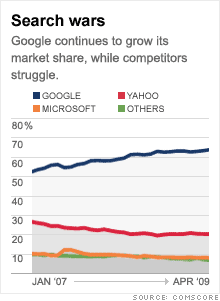Search wars: WolframAlpha joins the battle
Microsoft, Yahoo and WolframAlpha are nipping at Google's heels to gain market share in the search engine arena. Analysts say the battles are just beginning.


NEW YORK (CNNMoney.com) -- Search engine wars are heating up.
Microsoft is relaunching its search engine with new bells and whistles. Yahoo is getting away from results being generated as straight links and newcomer WolframAlpha has just released an "answer engine," designed to do just that...provide answers.
With a 64.2% market share, according to comScore, Google is the clear leader when it comes to online search. Experts say rivals like Yahoo (20.4% market share) and Microsoft (8.2% market share) will need to find ways of differentiating themselves in order to make a sizable dent.
"If you're going to compete with Google, you're not going to do it by being the same," said Carl Howe, tech analyst with Yankee Group.
Microsoft and Yahoo have been in and out of discussions about a potential search tie-up since early last year. Yahoo Chief Executive Carol Bartz told attendees at the All Things Digital conference in Carlsbad, Calif., Wednesday that talks between the two companies have continued "a little bit," but no agreement has been reached.
Sandeep Aggarwal, senior Internet research analyst with Collins Stewart LLC, said he expects an a Microsoft-Yahoo search deal to be reached by the time the companies report their quarterly results in late July.
Google's dominance in search goes even deeper than the market share numbers generated by comScore, said Aggarwal. Google gets most of its traffic from searches made directly on Google.com, while 98% of Yahoo's and Microsoft's traffic comes through portals like MSN and Yahoo Finance rather than searches on Yahoo.com and Live.com, he said.
That means competitors have an even steeper hill to climb, because "googling" has become synonymous with "search."
"We're creatures of habit," said Susan Feldman, search engine analyst with IDC. "The tech aspects of improving search are not as hard as improving the 'people' aspects."
Microsoft. Microsoft (MSFT, Fortune 500) is on the cusp of unveiling its new search engine under the code-name "Kumo" though it is expected to ultimately be called "Bing." Aggarwal, who has tested the new search engine, said Bing improves the relevance of its links and presents search results differently from Google, Yahoo and even from Microsoft's current search engine, Live.com.
Bing is set up to organize search results in relevant groups rather than as a series of links. For instance, a search for "fly to New York," may yield New York destinations like hotels, restaurants and museums as almost a guidebook page. The same search on Live.com generates straight individual links that users have to go through one by one.
Aggarwal said Bing may have chance at becoming a "destination" Web site like Google, because the site's technology has been better tested.
"Live wasn't ready for prime time because the technology was too premature" and users weren't repeat customers, he said. "Now Microsoft thinks they're ready."
A Microsoft spokeswoman declined to comment. Chief Executive Steve Ballmer may shed more light on Microsoft's search plans Thursday, when he is expected to speak at the All Things Digital conference.
Yahoo. Yahoo (YHOO, Fortune 500) is tinkering with the types of results that come up after a search.
The company is trying to provide information, including images and answers from databases, rather than a long series of links, according to analysts. For example, a search on Yahoo.com for "Star Trek" brings up an image with the movie trailer, a review, and a zip code/address box that will bring up local show times.
The strategy has already been implemented to a degree on a variety of search engines including Yahoo.com. The company has big plans to enhance its results even further and that could ultimately be a winning strategy for Yahoo.
"There's a staggering amount of information that exists out there, and search companies have to decide how to return the top 10 links and make that useful to people," said Feldman. "Yahoo can really get ahead if people don't have to click back and forth."
Yahoo was unavailable for immediate comment.
WolframAlpha. When WolframAlpha launched last week, there was a buzz that it could become the next Google "killer." But the company maintains that WolframAlpha isn't even a search engine. A query on WolframAlpha.com yields calculations and database results rather than links to other Web pages.
"It really is meant to supplement search, not to be a search competitor," said John Ekizian, spokesman for WolframAlpha. "WolframAlpha will always give you the right answer, and that's a lot different than search."
Still, some say search companies should watch out.
"People's search queries are getting longer over time," said Andrew Lipsman, director of industry analysis at comScore. "This might bode well for an engine like WolframAlpha, which appears designed to handle more detailed search queries."
Google. While competitors are nipping at Google's heels, the search giant isn't standing still.
"Search is not done, and Google (GOOG, Fortune 500) is not the be-all and end-all of search engines," said Howe. "Google would agree, and that's why they're constantly making changes too."
Marissa Mayer, Google's vice president of search products, told CNNMoney that Google released more than 360 relevance changes to improve the search engine last year.
Google continues to explore new ways to grow. "Search is a very competitive space, so for us there's always pressure to be better," said Mayer. "You need to keep up that pace of innovation."
New innovations like Google Squared, which will allow users to view searches in a matrix form on their screen, and Google voice search are in the works, she said.
Still, some think that Google's competitors are getting close to taking away some of Google's dominant market share.
"Microsoft and Yahoo have bridged the technology gap, so now they need to show that not everyone has to follow Google's philosophy, and not all search needs to look the same," said Aggarwal. "If they keep plugging away, maybe they can do some damage."
-- CNNMoney.com's Poppy Harlow contributed to this story ![]()

